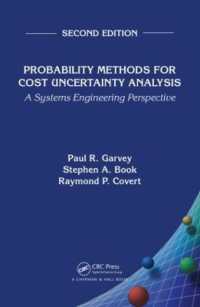Full Description
Since the turn of the twenty-first century, efforts to improve human rights, social equality, and democracy in western Europe have faced growing challenges that range from economic and medical crises to the resurgence of the tribalist far right. Studying western European cinema reveals how filmmakers have been using their art to reflect on the region's contemporary problems and potentials.
In Conflict and Survival in Contemporary Western European Film, John Alexander Williams and Alexandra Hagen have collected a diverse array of essays that analyzehow filmmakers have portrayed forms of strifeand endurancein the new century. Divided into three thematic sections—historical conflicts and national identities; migrants, natives, and battles over space; and ethical struggles in everyday life—this book offers case studies of historical context, narrative, and form in a range of significant recent films.
Showcasing such movies as Days of Glory, A War, Code Unknown, The Edge of Heaven, Toni Erdmann, The Great Beauty, and Weekend, this fascinating collection presents contemporary filmmakers as critical citizen-artists who are directly involved in interrogating the past, present, and future of Europe.
Contents
Foreword, Alexandra Hagen and John A. Williams
Part I: Historical Memory and National Identity: Representations of the Violent 20th Century
1.Who Gets to Be a National Hero? The Representation of North African Muslims in Days of Glory and Free Men, Priscilla Charrat Nelson
2.Screen Warriors: Danish Soldiers and National Identity in April 9th and A War, Ian Roberts
3.Escaping the Labyrinth of Silence: Cultural Change and the Frankfurt Auschwitz Trials in Contemporary German Film, Susanne Lenné Jones
4.Normalizing the Nazi Past in German Comedy? The Complexities of Laughter in Look Who's Back, Marina Durnin
Part II: Moving to and from Western Europe: Migrants, Their Enemies, and Their Allies
5.Refugees and Asylum Seekers in Contemporary German Film: Portrayals of a Nation between Tolerance and Xenophobia in We Are Young. We Are Strong and A Very German Welcome, Markus Spitz
6.Transnational Mobility and Migration in The Edge of Heaven, Sarra Kassem
7.Eastern Passage: Emigration from Romania to Western E







